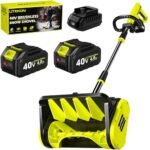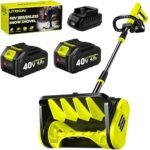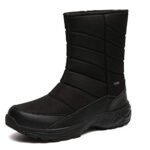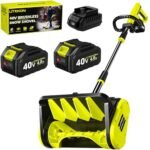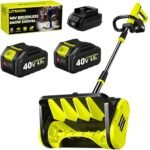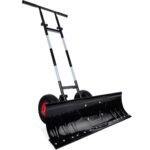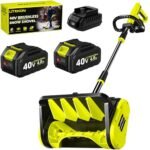The 1998 Chevy Silverado is a reliable truck, but some owners face hard starting problems. These issues can be frustrating, especially on cold mornings or after the vehicle sits for a while. The main causes of hard starting in a 1998 Chevy Silverado include fuel system problems, a weak battery, or a faulty starter motor.
Common fuel system issues that lead to hard starts are clogged fuel filters, malfunctioning fuel pumps, or problems with fuel pressure. A weak battery might not have enough power to turn the engine over quickly. Starter motors can wear out over time, making it harder for the engine to crank.
Cold weather can make these problems worse. The engine oil thickens in low temperatures, making it harder for the starter to turn the engine. Fuel can also be slower to vaporize in cold conditions, which affects the starting process.
Key Takeaways
- Fuel system issues, weak batteries, and faulty starters are common causes of hard starting
- Cold weather can worsen starting problems in the 1998 Chevy Silverado
- Regular maintenance and prompt repairs can help prevent and resolve hard starting issues
Common Causes of Hard Starting
The 1998 Chevy Silverado can face starting problems due to several key issues. These usually involve the fuel system, ignition components, or the battery and starter. Let’s look at each of these areas in detail.
Fuel System Issues
Fuel system problems often cause hard starting in a 1998 Chevy Silverado. A weak fuel pump may not supply enough pressure to start the engine quickly. This can lead to extended cranking before the truck starts.
A clogged fuel filter can restrict fuel flow, making it hard for the engine to get the gas it needs to fire up. Regular filter changes can prevent this issue.
Faulty fuel injectors might not spray fuel properly into the cylinders. This can cause uneven fuel distribution and make starting difficult, especially when the engine is cold.
Lastly, a bad fuel pressure regulator can allow too much or too little fuel into the engine. This throws off the air-fuel mixture, leading to hard starts.
Ignition System Failures
The ignition system is crucial for starting a Silverado. Worn spark plugs may not create a strong enough spark to ignite the fuel. This results in slow starts or the engine failing to turn over.
Faulty ignition coils can’t produce the high voltage needed for the spark plugs. This leads to misfires and starting issues. Bad spark plug wires can also cause similar problems by not delivering the spark effectively.
A failing distributor cap or rotor can disrupt the timing of the spark. This makes it hard for the engine to start and run smoothly. Regular checks of these parts can help catch problems early.
Battery and Starter Problems
A weak battery is a common cause of hard starting. Cold weather can make this worse by reducing battery power. Testing the battery regularly can help avoid surprise failures.
Corroded battery terminals can prevent proper current flow. This makes it hard for the starter to crank the engine. Cleaning the terminals often solves this issue.
A failing starter motor may not turn the engine over fast enough to start. This results in slow cranking or clicking sounds when trying to start the truck.
Loose or damaged starter wires can also cause starting problems. They may prevent the full power from reaching the starter, leading to weak cranking attempts.
Diagnostic Approaches
Finding the cause of hard starting in a 1998 Chevy Silverado requires a systematic approach. Mechanics use several methods to pinpoint the issue, from basic visual checks to advanced electronic testing.
Initial Inspection
A thorough visual inspection is the first step in diagnosing hard starting problems. Mechanics check for obvious issues like corroded battery terminals or loose wiring connections. They look for signs of fuel leaks or damaged vacuum lines.
The inspection includes checking fluid levels, especially engine oil and coolant. Low levels can cause starting difficulties. Mechanics also examine the air filter for excessive dirt buildup, which can restrict airflow and affect starting.
They listen for unusual sounds when attempting to start the engine. Clicking noises might indicate a weak battery or starter motor issues. A lack of fuel pump noise could point to fuel system problems.
Troubleshooting Fuel Delivery
Fuel delivery issues often cause hard starting problems in Chevy Silverados. Mechanics first check the fuel pressure using a gauge connected to the fuel rail. Low pressure may indicate a weak fuel pump or clogged fuel filter.
They inspect the fuel injectors for clogs or leaks. A faulty fuel pressure regulator can also cause hard starting, especially when cold. Mechanics test the regulator’s function and replace it if necessary.
The fuel pump is tested for proper operation. A weak pump may not deliver enough fuel to start the engine, especially after sitting overnight. If the pump is failing, it often makes a loud whining noise.
Testing Ignition Components
Ignition system problems can prevent the engine from starting easily. Mechanics check spark plug condition, looking for signs of wear, fouling, or improper gap. They test spark intensity using a spark tester.
The ignition coil is tested for proper resistance and output. A weak coil may not produce enough spark to ignite the fuel mixture. The distributor cap and rotor are inspected for cracks or carbon tracking.
Mechanics also check the crankshaft position sensor, as a faulty sensor can prevent the engine from starting. They use a multimeter to test sensor resistance and output voltage.
Assessing Battery Health
A weak battery is a common cause of hard starting. Mechanics test the battery’s voltage and load capacity using a battery tester. They look for signs of corrosion on terminals and clean them if needed.
The alternator is checked to ensure it’s properly charging the battery. A failing alternator can leave the battery undercharged, leading to starting problems. Mechanics test alternator output using a voltmeter.
They also inspect and test the starter motor. A worn starter may struggle to turn the engine over, especially in cold weather. The starter solenoid is checked for proper operation, as it can cause intermittent starting issues.
Improving Starter Performance
Enhancing your 1998 Chevy Silverado’s starter performance can help solve hard starting issues. Better components and proper maintenance are key to a more reliable start.
Upgrading Starter Components
A high-torque starter can give your Silverado the boost it needs. These starters provide more cranking power, especially in cold weather. Look for a starter rated at 2.0 kW or higher for best results.
Consider replacing the stock solenoid with a heavy-duty version. This can improve electrical flow and reduce voltage drop. A new starter drive assembly can also help if the old one is worn out.
Upgrading to thicker gauge wiring for the starter circuit can reduce resistance. This allows more current to reach the starter motor. Use at least 4 gauge wire for the main power cable.
Maintaining Electrical Connections
Clean all battery terminals and cable ends with a wire brush. Remove any corrosion buildup. Apply a thin coat of dielectric grease to prevent future corrosion.
Check and tighten all ground connections. Look for ground straps in the engine bay, especially near the battery and on the frame above the starter.
Inspect the starter solenoid connections. Make sure they are clean and tight. Replace any damaged or frayed wires.
Test the voltage drop across the starter circuit. Use a multimeter to check for no more than 0.5V drop when cranking. Higher drops indicate resistance problems that need fixing.
Technical Tips for Cold Weather Starts
Cold weather can make starting a 1998 Chevy Silverado challenging. Here are some practical tips to help get your truck running smoothly in chilly conditions.
Use the right oil. Switch to a thinner, winter-grade oil that flows better in cold temperatures. This helps reduce engine wear during startup.
Check your battery. Cold weather reduces battery performance. Make sure your battery is fully charged and in good condition. Consider using a battery blanket for extra protection.
Inspect the fuel system regularly. A clean fuel filter and properly functioning fuel pump are crucial for cold starts. Replace these components if needed.
Warm up the engine block. An engine block heater can be a lifesaver in extremely cold climates. It keeps the engine warm, making starts easier.
Keep the gas tank full. A fuller tank helps prevent moisture buildup in the fuel system, which can lead to starting issues.
Use starting fluid cautiously. While it can help in emergencies, overuse can damage engine components. Use only as a last resort.
By following these tips, you can improve your 1998 Chevy Silverado’s cold-weather starting performance and avoid frustrating mornings.
Professional Help and Services
When dealing with hard starting problems in a 1998 Chevy Silverado, seeking professional help can be a wise choice. Experienced mechanics have the tools and knowledge to diagnose and fix complex issues.
Many auto repair shops specialize in Chevrolet vehicles. They can perform thorough diagnostics to pinpoint the exact cause of the starting problem. This may include checking the fuel system, electrical components, and engine parts.
Some common services a professional might provide include:
- Fuel system inspection and cleaning
- Battery and alternator testing
- Starter motor examination
- Ignition system check
- Fuel pump replacement if necessary
Dealerships often have technicians trained specifically for Chevrolet vehicles. They can access manufacturer-specific diagnostic tools and information.
For complex issues, it’s best to choose a repair shop with ASE-certified technicians. These professionals have passed rigorous tests and maintain up-to-date knowledge of vehicle systems.
Before selecting a service provider, car owners should research reviews and ask for recommendations. It’s also helpful to get multiple quotes to ensure fair pricing for the required repairs.
Frequently Asked Questions
The 1998 Chevy Silverado can face several hard starting issues. These problems often stem from fuel system components, electrical parts, or engine-related factors. Proper diagnosis and maintenance are key to resolving and preventing these issues.
What are common causes of hard starting issues in 1998 Chevy Silverado trucks?
Fuel system problems are frequent culprits. A clogged fuel filter or malfunctioning fuel pump can cause hard starting. Electrical issues like a weak battery or faulty starter motor may also be responsible.
Ignition system components, including spark plugs and ignition coils, can deteriorate over time and lead to starting difficulties.
How do I troubleshoot intermittent hard start problems in a 5.7 Vortec engine?
Check the fuel pressure when the issue occurs. Low pressure may indicate a failing fuel pump or clogged filter. Inspect the spark plugs for wear or damage.
Test the battery and alternator to ensure they’re providing sufficient power. Examine the ignition coil for signs of failure, as this can cause intermittent starting problems.
Can a weak fuel pump lead to starting difficulties in a 1998 Chevy Silverado?
Yes, a weak fuel pump can cause hard starting. It may not deliver enough fuel pressure to start the engine, especially when cold.
A weakened fuel pump can struggle to push fuel to the engine, making it difficult to start. This issue often worsens in colder temperatures.
What steps should be taken to diagnose a 1998 Chevy Silverado that is difficult to start after sitting?
First, check the battery voltage. A drained battery is a common cause of hard starting after sitting. Inspect fuel lines for leaks or blockages.
Test the fuel pressure to ensure it’s within specifications. Examine the starter motor and solenoid for signs of wear or damage.
Are there known electrical issues that could cause hard starting problems in GMT400 trucks?
Corroded battery terminals can prevent proper current flow. Worn-out ignition switches may fail to engage the starter consistently.
Faulty neutral safety switches can also cause starting issues. These trucks may experience problems with the ignition control module, leading to hard starts.
What maintenance tips can prevent hard starting in older Chevy Silverado models?
Regular oil changes help maintain engine health. Replace the fuel filter according to the manufacturer’s recommendations.
Keep the battery clean and charged. Inspect and replace spark plugs at recommended intervals. Check and clean electrical connections periodically to prevent corrosion-related issues.
When you purchase a product through Amazon links on carsolutionpro.com, we may earn a small commission at no extra cost to you. This helps support the site and keep our content free. As an Amazon Associate, we earn from qualifying purchases made through our links.

